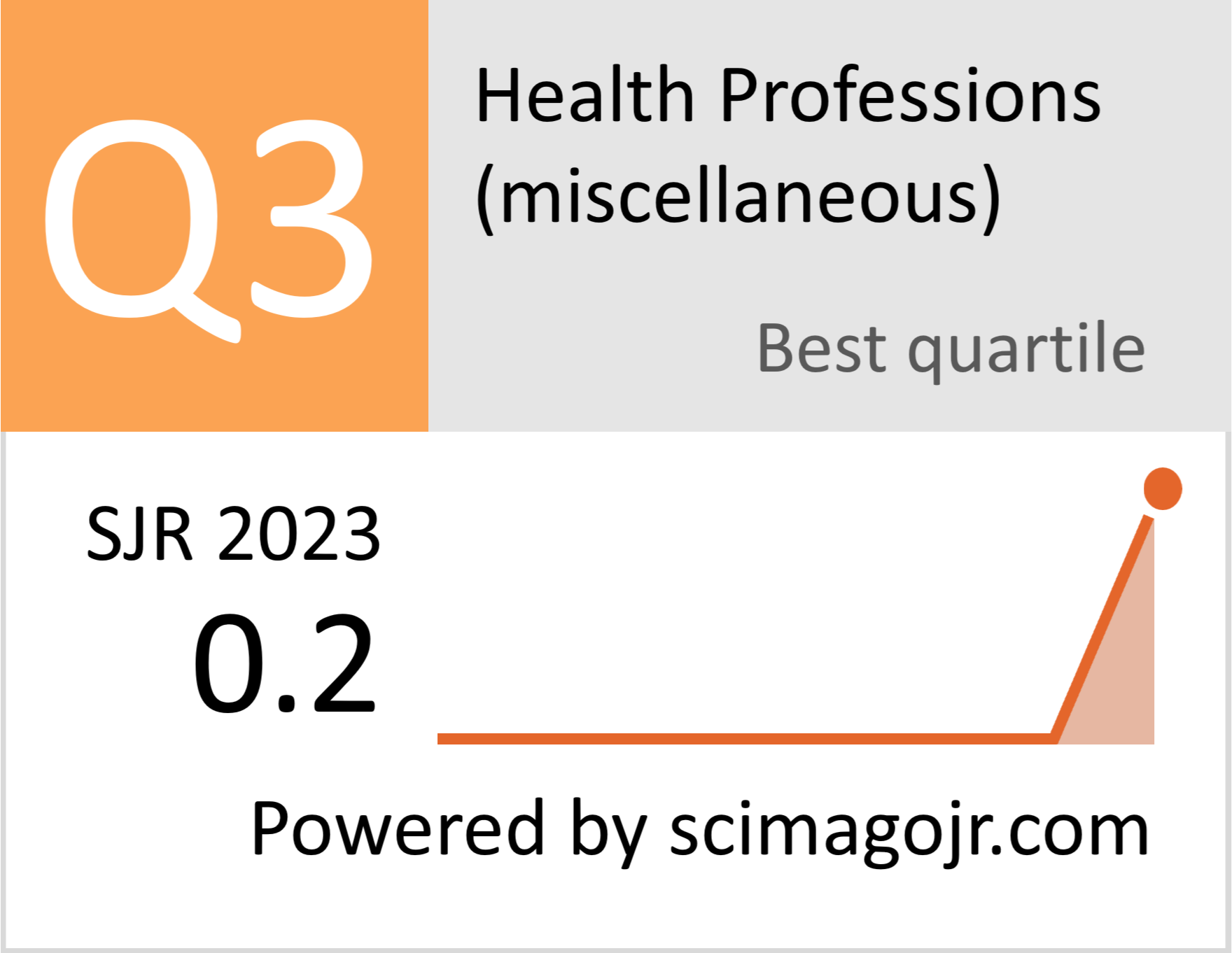Surveying Colombian Speech-Language Pathologists on their Reported Training & Practices of Auditory-Perceptual Evaluation of Voice
Encuestando a fonoaudiólogos colombianos sobre su entrenamiento y prácticas reportadas en la evaluación perceptual auditiva de la voz

This work is licensed under a Creative Commons Attribution-NonCommercial-NoDerivatives 4.0 International License.
Show authors biography
Objective. To explore the training and use of auditory perceptual evaluation of the voice reported by Colombian speech-language pathologists.
Study Design. Cross-sectional observational research with a quantitative approach.
Methods. A digital questionnaire was designed and distributed to gather information regarding professionals' training process and implementation of auditory-perceptual evaluation procedures. Descriptive statistics were applied, and several generalized linear models were adjusted to determine the influence of certain variables on others.
Results. The survey received responses from 40 speech-language pathologists, revealing that the most used scales for training and evaluating vocal quality within this group are direct magnitude estimations (82.5% and 77.5%). Similarly, in this group, the tasks most frequently used to train and use as an evaluation strategy are vowel assessments (38%) followed by spontaneous speech (30%). Practitioners of this group were mostly trained using a conceptual framework involving multiple exposures to rating (42.5%). The use of direct magnitude estimation in training with a normal voice showed significance (p = 0.015), as did the use of the vowel /i/ in training with an equal-appearing interval (p = 0.013). The statistical models relating the scale used to the scale on which participants were trained were also significant (p < 0.05).
Conclusions. The GRBAS scale is the training tool most used by the group of speech-language pathologists of the study group in Colombia. Future efforts should focus on improving training practices for auditory-perceptual evaluation, exploring alternative conceptual frameworks, and incorporating external references to enhance validity and reliability.
Article visits 442 | PDF visits 175
- Kempster GB, Gerratt BR, Verdolini Abbott K, Barkmeier-Kraemer J, Hillman RE. Consensus Auditory-Perceptual Evaluation of Voice: Development of a Standardized Clinical Protocol. Am J Speech Lang Pathol [Internet]. 2009;18(2):124-32. doi: https://doi.org/10.1044/1058-0360(2008/08-0017)
- Van Stan JH, Whyte J, Duffy JR, Barkmeier-Kraemer J, Doyle P, Gherson S, et al. Voice Therapy According to the Rehabilitation Treatment Specification System: Expert Consensus Ingredients and Targets. Am J Speech Lang Pathol [Internet]. 2021;30(5):2169-201. doi: https://doi.org/10.1044/2021_AJSLP-21-00076
- Morato-Galán M, Caminero Cueva MJ, Rodrigo JP, Suárez Nieto C, Núñez-Batalla F. Valoración de la calidad vocal tras el tratamiento del carcinoma faringolaríngeo avanzado en un protocolo de preservación de órgano. Acta Otorrinolaringol Esp [Internet]. 2014;65(5):283-8. doi: https://doi.org/10.1016/j.otorri.2013.12.005
- Kreiman J, Gerratt BR, Kempster GB, Erman A, Berke GS. Perceptual Evaluation of Voice Quality: Review, Tutorial, and a Framework for Future Research. J Speech Lang Hear Res [Internet]. 1993;36(1):21-40. doi: https://doi.org/10.1044/jshr.3601.21
- Gerratt BR, Kreiman J, Antonanzas-Barroso N, Berke GS. Comparing Internal and External Standards in Voice Quality Judgments. J Speech Lang Hear Res [Internet]. 1993;36(1):14-20. doi: https://doi.org/10.1044/jshr.3601.14
- Kreiman J, Gerratt BR. Validity of rating scale measures of voice quality. J Acoust Soc Am [Internet]. 1998;104(3):1598-608. doi: https://doi.org/10.1121/1.424372
- Ghio A, Dufour S, Wengler A, Pouchoulin G, Revis J, Giovanni A. Perceptual Evaluation of Dysphonic Voices: Can a Training Protocol Lead to the Development of Perceptual Categories? J Voice [Internet]. 2015;29(3):304-11. doi: https://doi.org/10.1016/j.jvoice.2014.07.006
- Chan KMK, Yiu EM-L. The Effect of Anchors and Training on the Reliability of Perceptual Voice Evaluation. J Speech Lang Hear Res [Internet]. 2002;45(1):111-26. doi: https://doi.org/10.1044/1092-4388(2002/009)
- Altenberg EP, Ferrand CT. Perception of Individuals with Voice Disorders by Monolingual English, Bilingual Cantonese–English, and Bilingual Russian–English Women. J Speech Lang Hear Res [Internet]. 2006;49(4):879-87. doi: https://doi.org/10.1044/1092-4388(2006/063)
- Chaves CR, Campbell M, Côrtes Gama AC. The Influence of Native Language on Auditory-Perceptual Evaluation of Vocal Samples Completed by Brazilian and Canadian SLPs. J Voice [Internet]. 2017;31(2):258.e1-258.e5. doi: https://doi.org/10.1016/j.jvoice.2016.05.021
- De Bodt MS, Wuyts FL, Van de Heyning PH, Croux C. Test-retest study of the GRBAS scale: Influence of experience and professional background on perceptual rating of voice quality. J Voice [Internet]. 1997;11(1):74-80. doi: https://doi.org/10.1016/S0892-1997(97)80026-4
- Eadie TL, Kapsner M, Rosenzweig J, Waugh P, Hillel A, Merati A. The Role of Experience on Judgments of Dysphonia. J Voice [Internet]. 2010;24(5):564-73. doi: https://doi.org/10.1016/j.jvoice.2008.12.005
- Eadie TL, Kapsner-Smith M. The Effect of Listener Experience and Anchors on Judgments of Dysphonia. J Speech Lang Hear Res [Internet]. 2011;54(2):430-47. doi: https://doi.org/10.1044/1092-4388(2010/09-0205)
- Chan KMK, Yiu EM-L. A Comparison of Two Perceptual Voice Evaluation Training Programs for Naive Listeners. J Voice [Internet]. 2006;20(2):229-41. doi: https://doi.org/10.1016/j.jvoice.2005.03.007
- Walden PR, Khayumov J. The Use of Auditory-Perceptual Training as a Research Method: A Summary Review. J Voice [Internet]. 2022;36(3):322-34. doi: https://doi.org/10.1016/j.jvoice.2020.06.032
- Patel S, Shrivastav R, Eddins DA. Developing a Single Comparison Stimulus for Matching Breathy Voice Quality. J Speech Lang Hear Res [Internet]. 2012;55(2):639-47. doi: https://doi.org/10.1044/1092-4388(2011/10-0337)
- Anand S, Kopf LM, Shrivastav R, Eddins DA. Objective Indices of Perceived Vocal Strain. J Voice [Internet]. 2019;33(6):838-45. doi: https://doi.org/10.1016/j.jvoice.2018.06.005
- Eadie TL, Baylor CR. The Effect of Perceptual Training on Inexperienced Listeners’ Judgments of Dysphonic Voice. J Voice [Internet]. 2006;20(4):527-44. doi: https://doi.org/10.1016/j.jvoice.2005.08.007
- Sofranko JL, Prosek RA. The Effect of Levels and Types of Experience on Judgment of Synthesized Voice Quality. J Voice [Internet]. 2014;28(1):24-35. doi: https://doi.org/10.1016/j.jvoice.2013.06.001
- Webb AL, Carding PN, Deary IJ, MacKenzie K, Steen N, Wilson JA. The reliability of three perceptual evaluation scales for dysphonia. Eur Arch Otorhinolaryngol [Internet]. 2004;261(8):429-34. doi: https://doi.org/10.1007/s00405-003-0707-7
- Zraick RI, Kempster GB, Connor NP, Thibeault S, Klaben BK, Bursac Z, et al. Establishing Validity of the Consensus Auditory-Perceptual Evaluation of Voice (CAPE-V). Am J Speech Lang Pathol [Internet]. 2011;20(1):14-22. doi: https://doi.org/10.1044/1058-0360(2010/09-0105)
- Nagle KF. Emerging Scientist: Challenges to CAPE-V as a Standard. Perspect ASHA SIGs [Internet]. 2016;1(3):47-53. doi: https://doi.org/10.1044/persp1.SIG3.47
- Shrivastav R, Sapienza CM, Nandur V. Application of Psychometric Theory to the Measurement of Voice Quality Using Rating Scales. J Speech Lang Hear Res [Internet]. 2005;48(2):323-35. doi: https://doi.org/10.1044/1092-4388(2005/022)
- Patel RR, Awan SN, Barkmeier-Kraemer J, Courey M, Deliyski D, Eadie T, et al. Recommended Protocols for Instrumental Assessment of Voice: American Speech-Language-Hearing Association Expert Panel to Develop a Protocol for Instrumental Assessment of Vocal Function. Am J Speech Lang Pathol [Internet]. 2018;27(3):887-905. doi: https://doi.org/10.1044/2018_AJSLP-17-0009
- Eadie TL, Doyle PC. Direct magnitude estimation and interval scaling of pleasantness and severity in dysphonic and normal speakers. J Acoust Soc Am [Internet]. 2002;112(6):3014-21. doi: https://doi.org/10.1121/1.1518983
- Iwarsson J, Bingen-Jakobsen A, Johansen DS, Kølle IE, Pedersen SG, Thorsen SL, et al. Auditory-Perceptual Evaluation of Dysphonia: A Comparison Between Narrow and Broad Terminology Systems. J Voice [Internet]. 2018;32(4):428-36. doi: https://doi.org/10.1016/j.jvoice.2017.07.006
- Yamauchi EJ, Imaizumi S, Maruyama H, Haji T. Perceptual evaluation of pathological voice quality: A comparative analysis between the RASATI and GRBASI scales. Logopedics Phoniatrics Vocology [Internet]. 2010;35(3):121-8. doi: https://doi.org/10.3109/14015430903334269
- Maryn Y, Corthals P, Van Cauwenberge P, Roy N, De Bodt M. Toward Improved Ecological Validity in the Acoustic Measurement of Overall Voice Quality: Combining Continuous Speech and Sustained Vowels. J Voice [Internet]. 2010;24(5):540-55. doi: https://doi.org/10.1016/j.jvoice.2008.12.014
- Maryn Y, Roy N. Sustained vowels and continuous speech in the auditory-perceptual evaluation of dysphonia severity. J Soc Bras Fonoaudiol [Internet]. 2012;24(2):107-12. doi: https://doi.org/10.1590/S2179-64912012000200003
- Anand S, Skowronski MD, Shrivastav R, Eddins DA. Perceptual and Quantitative Assessment of Dysphonia Across Vowel Categories. J Voice [Internet]. 2019;33(4):473-81. doi: https://doi.org/10.1016/j.jvoice.2017.12.018
- Delgado Romero C. La identificación de locutores en el ámbito forense [PhD’s thesis]. Madrid: Universidad Complutense de Madrid. 2001. 366 p. Available from: https://docta.ucm.es/handle/20.500.14352/55123
- dos Santos PCM, Vieira MN, Sansão JPH, Gama ACC. Effect of Auditory-Perceptual Training With Natural Voice Anchors on Vocal Quality Evaluation. J Voice [Internet]. 2019;33(2):220-5. doi: https://doi.org/10.1016/j.jvoice.2017.10.020
- Solomon NP, Helou LB, Stojadinovic A. Clinical Versus Laboratory Ratings of Voice Using the CAPE-V. J Voice [Internet]. 2011;25(1):e7-14. doi: https://doi.org/10.1016/j.jvoice.2009.10.007
- Helou LB, Solomon NP, Henry LR, Coppit GL, Howard RS, Stojadinovic A. The Role of Listener Experience on Consensus Auditory-Perceptual Evaluation of Voice (CAPE-V) Ratings of Postthyroidectomy Voice. Am J Speech Lang Pathol [Internet]. 2010;19(3):248-58. doi: https://doi.org/10.1044/1058-0360(2010/09-0012)
- Cantarella G, Barillari MR, Lechien JR, Pignataro L. The Challenge of Virtual Voice Therapy During the COVID-19 Pandemic. J Voice [Internet]. 2021;35(3):336-7. doi: https://doi.org/10.1016/j.jvoice.2020.06.015
- Castillo-Allendes A, Contreras-Ruston F, Cantor-Cutiva LC, Codino J, Guzman M, Malebran C, et al. Voice Therapy in the Context of the COVID-19 Pandemic: Guidelines for Clinical Practice. J Voice [Internet]. 2021;35(5):717-27. doi: https://doi.org/10.1016/j.jvoice.2020.08.001
- Fujiki RB, Sanders PW, Sivasankar MP, Halum S. Determining Medical Urgency of Voice Disorders Using Auditory-Perceptual Voice Assessments Performed by Speech-Language Pathologists. Ann Otol Rhinol Laryngol [Internet]. 2022;131(6):579-86. doi: https://doi.org/10.1177/00034894211032779
- Dahl KL, Weerathunge HR, Buckley DP, Dolling AS, Díaz-Cádiz M, Tracy LF, et al. Reliability and Accuracy of Expert Auditory-Perceptual Evaluation of Voice via Telepractice Platforms. Am J Speech Lang Pathol [Internet]. 2021;30(6):2446-55. doi: https://doi.org/10.1044/2021_AJSLP-21-00091
- Behrman A. Common Practices of Voice Therapists in the Evaluation of Patients. J Voice [Internet]. 2005;19(3):454-69. doi: https://doi.org/10.1016/j.jvoice.2004.08.004
- Peña Sánchez MJ, Ángel Gordillo LF, Sastoque Hernández ME, Rodríguez Campo A, Calvache Mora CA. Evaluación Perceptual de la Voz: Resignifcando lo que hacemos. Jornada de teleconferencias nacionales Celebración Día mundial de la voz 2018. Rev Colomb Rehabil [Internet]. 2018;17(1):52-8. doi: https://doi.org/10.30788/RevColReh.v17.n1.2018.322
- Peña Sánchez MJ. Evaluación perceptual auditiva. Fundamento de la valoración integral de la voz. In: Cecconello LA, editor. Iº Congreso Iberoamericano de voz cantada y hablada [Internet]; 2010 Oct 22-23; Buenos Aires, Argentina: Fundación Iberoamericana de voz cantada y hablada; 2010. p. 32-41.
- Ma EP-M, Yiu EM-L. Handbook of Voice Assessments. 1st ed. San Diego: Plural Publishing; 2011. 400 p.
- Hurren A, Miller N, Carding P. Perceptual Assessment of Tracheoesophageal Voice Quality with the SToPS: The Development of a Reliable and Valid Tool. J Voice [Internet]. 2019;33(4):465-72. doi: https://doi.org/10.1016/j.jvoice.2017.12.006
- Chan KMK, Li M, Law TY, Yiu EML. Effects of immediate feedback on learning auditory perceptual voice quality evaluation. Int J Speech Lang Pathol [Internet]. 2012;14(4):363-9. doi: https://doi.org/10.3109/17549507.2012.679746
- Hirano M. Clinical examination of voice. Berlin: Springer Verlag; 1981. 100 p.
- Wilson D. Voice problems of children. Philadelphia: Williams & Wilkins; 1987. 400 p.
- Heuillet-Martin G, Garson-Bavard H, Legré A. Una voz para todos. SOLAL; 2003. 400 p.



